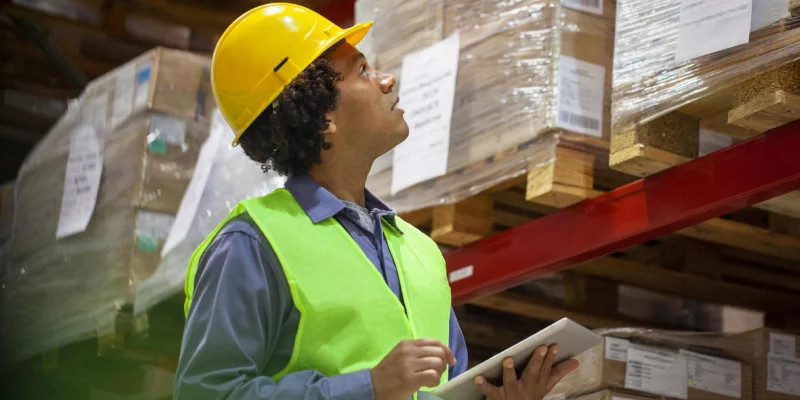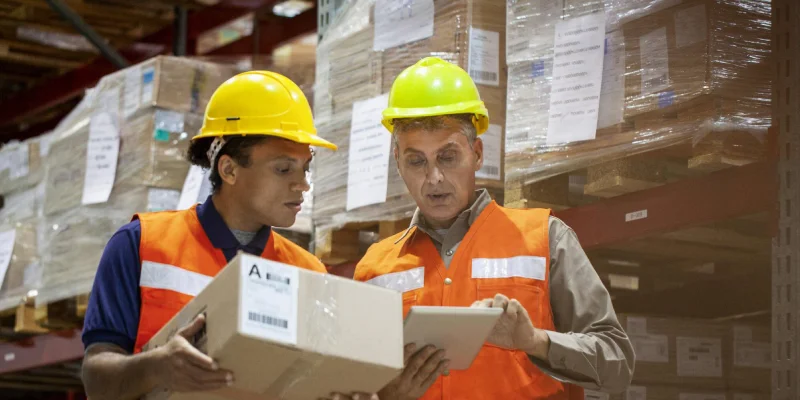Data-Driven Insights for Improved Logistics Performance with a Digital Audit App

March 20 , 2024
Efficient and optimized logistics are now necessities today. Increasing customer happiness, decreasing expenses, and streamlining operations should always be part of a company’s goals. When using valuable insights derived from big data and pioneering tech, businesses can get these goals very well.
A digital audit software with strong data analytics capabilities can make all the difference in improving logistics performance. And this blog will discuss about this.
The Challenge of Traditional Logistics Management

Logistics management based on piles of paper, manual processes, and separate data is having difficulty keeping up with the needs of quickly moving business life – the old-fashioned way of doing things causes several major problems that make actions less efficient and less profitable: –
1. The Inconsistency Conundrum
Without the insights from thorough data analysis, it’s like driving while wearing a blindfold: it’s hard to tell where speed problems and possible bottlenecks are and how to fix them – makes performance less reliable, which hurts efficiency and profits even more.
2. Limited Visibility, Limited Solutions
Data that is locked away in different systems, or silos, makes it hard to see the whole transportation network as a whole – lack of a complete picture makes it hard to find and deal with possible problems before they worsen, slowing down effective solutions and quick decisions.
3. The Costly Domino Effect
Due to the limits of old methods, some inefficiencies and delays cause a ripple effect. When resources are wasted, costs increase, productivity decreases, and customer happiness goes through the roof. Ultimately, this means less profit, which puts businesses at risk of long-term failure.
4. The Time-Sucking Trap
Data entry by hand is time-consuming and prone to mistakes. That time could be better spent planning strategically and fixing problems before they happen.
Introducing the Digital audit app

A digital audit app for Play Store collects and analyzes data from many places along the supply chain and acts as the digital nerve center of your logistics operations. By compiling all this information, companies can learn much about different parts of their logistics systems, leading to better efficiency, accuracy, and performance. Here are some of the most important types of data that a digital audit app can collect and look at: –
1. Levels of Inventory
Keeping track of inventory is very important in logistics, and a digital audit application lets you see the amounts of inventory in warehouses, distribution centers, and stores in real-time.
By keeping track of stock levels, businesses can ensure they have the right amount of inventory, avoid running out or having too much, and improve the general efficiency of their supply chain.
The app can also send alerts when an item runs low, ensuring supplies are restocked on time and processes run smoothly.
2. Delivery Performance
Data on delivery performance measures how quickly and correctly packages you can send from the warehouse to the customer’s door. You can make sure that orders are finished rapidly and accurately; a digital audit app for Android keeps track of delivery routes, transit times, and delivery statuses.
By looking at delivery performance measures, businesses can improve customer happiness, reduce transit times, and make delivery routes more efficient. The app can also collect customer comments about their delivery experiences, which lets businesses quickly fix any problems or issues.
3. Transportation Data
Transportation data includes many things related to moving goods, like routes, plans, and fuel use. An inspection audit app gathers information from GPS tracking systems, telematics devices, and transportation management systems to monitor how well drivers and cars are doing— information can help find the best ways to save fuel money, cut idle time, and make the whole fleet more efficient.
The app can also give information about delivery times, which helps businesses meet customer standards for being on time and reliable.
4. Customer Feedback
Data from customer feedback tells you a lot about the level of service and how happy customers are in general. A digital audit app gathers feedback through many means, including polls, reviews, and social media sites.
Companies can find trends, spot possible problems, and make choices based on data to improve the customer experience by looking at customer feedback data.
The app can also create dashboards and reports to monitor key success indicators like how happy, loyal, and long-term your customers are.
5. Warehouse Operations

Data about picking, packing, shipping, and getting items in the warehouse is part of warehouse operations data.
A digital audit app for App Store gets information from barcode readers, RFID tags, and other tracking devices to monitor how items move around the building— data shows businesses can find slow spots, make processes more efficient, and raise worker output.
In addition, the app can create reports on order accuracy, order cycle times, and warehouse usage, making it possible to improve processes and achieve operational excellence.
Tie together the Power of Data
Businesses can use data to get valuable insights with the digital audit tool. How to do it: –
- Real-time visibility: -The app gives you a real-time view of the logistics environment, so you can quickly spot problems and make changes before they happen.
- Route optimization: – Looking at data can help you find the best transport routes by considering traffic patterns, weather, and how much fuel each route uses.
- Root cause analysis: -The app can help find the root causes of performance problems by digging deeper into the data— and lets users find specific answers.
- Predictive maintenance: -The app can look at monitor data from equipment to figure out what problems might happen and set up preventative maintenance, which cuts down on costs and downtime.
- Performance analytics: -Tools for visualizing data help find trends, keep track of key performance indicators (KPIs), and see how healthy plans work.
- Better use of resources: – You can see resource utilization. The optimization of personnel, tools, and infrastructure for efficiency across the board.
Benefits of Data-Driven Logistics
Using a digital audit app and moving toward data-driven processes can have many significant advantages, such as: –
- Highly mollified customers: – customers are better-off and more loyal with on-time deliveries, correct orders, and good contact.
- Affordable costs: – Labor, storage, and transportation costs are less than you wish for with better supply chain management and no waste occurrence.
- Strong Productivity: – Your team can do that more critical task more efficiently and with focus because automation and streamlining processes free up less important tasks or repetitive tasks.
- Better ability to make decisions: -Businesses can make better choices based on real-time data thanks to data-driven insights, leading to better strategic planning and execution.
- A competitive edge: – Businesses gain a competitive edge in the market when they use data to drive continuous improvement— adapt quickly to changing market dynamics, innovate proactively, and outperform competitors.
Getting Started with a Digital Audit App

When setting up a digital audit app for iOS, here are some essential things to keep in mind: –
1. Figure out what you need
Before you start the decision process, know exactly what your company wants and needs from an auditing app. It would help to think about the unique problems and issues you want to solve. Are you having trouble with inaccurate inventory, inefficient processes, issues with safety, or something else?
Your Logistics found that inventory management was inaccurate because of manual auditing methods, which caused stock-outs and late shipments. An inspection audit app can help you keep track of your goods more accurately and make the auditing process easier.
2. Picking out features
Once you know what you need, compare auditing apps based on their features and functions. Look for apps that can do things specific to your business, like capturing data in real-time, allowing you to change audit patterns, setting off automatic alerts, and giving you tools for reporting.
It works well with the tools you already have and lets you see how your fleet is running in real-time. You can choose the most essential features, such as GPS tracking, watching driver performance, and managing compliance.
3. Data Integration
Make sure that the digital audit app you choose works well with the systems and data sources that your company already has. It would help if you had seamless integration to get accurate and up-to-date information about your logistics processes.
Your Warehouse Solutions should have a digital audit app that works well with their current Warehouse Management System (WMS) and barcode reading equipment— connection is vital because it makes moving data between the inventory database and the auditing app easy. As a result, audits are faster and more accurate, which makes auditing methods more effective overall.
4. Adoption by users
Spend money on thorough training and help ensure users adopt the digital audit app quickly. Hold hands-on training sessions for your workers to get them used to the app’s features and how it works. To encourage successful use, ask for feedback and address any concerns.
The warehouse staff can learn how to use the new digital audit app at classes by Your Logistics. They give employees ongoing support and tools to help them fix problems and get the most out of the app in their daily work.
How will digital audit apps shape logistics management in the years to come?
1. More automation and better efficiency
By automating tedious chores and improving workflows, the Digital audit app will make logistics even easier. As AI and machine learning improve, these apps will get even smarter. They can look at vast amounts of data in real-time to find patterns, predict problems, and suggest proactive answers. Because of this, turnaround times will be shorter, costs will go down, and total performance will improve.
2. Longevity and Effects on the Environment
Sustainability is becoming more and more critical in the shipping industry. Digital audit apps will be beneficial in helping companies lower their environmental impact.
These apps will keep track of essential sustainability measures like carbon emissions, fuel use, and waste production— and will help businesses find ways to be more environmentally friendly and put plans in place to do so.
Digital audit apps will help companies be more environmentally friendly and responsible by finding the best delivery paths and reducing packaging waste.
3. Visibility and openness in real-time
When they come out, the Digital audit app will make the whole supply chain more visible and clear.
Businesses will be able to receive essential data and insights in real-time, from getting the raw materials to delivering the finished product.
It will help them make better decisions and respond more quickly to changes in the market.
Such openness will make it easier for everyone to work together, strengthening relationships and making logistics run more smoothly.
4. Adding new technologies to the mix
Auditing apps can be helpful with the integration of new technologies like blockchain, IoT, and self-driving cars emerge.
When connected with these techs, these apps will give even more information and options. Your logistics operations and decisions will now be more accessible, and you can track and trace items easily.
Moreover, you can monitor assets in real-time and make decisions in logistics operations. Thus, such integration will make transportation management highly reliable, proficient, and open to new ideas.
5. Analytics for making predictions and managing risk
With the addition of predictive analytics in the Digital audit app, logistics managers can see possible problems coming. They can take steps to reduce risks before they get worse.
Such valuable apps will help businesses find weak spots in their procurement, logistics, or production supply lines. They can make excellent plans to fix them before they happen. They do this by looking at historical data as well as outside factors like weather patterns, geopolitical events, and market trends.
Conclusion
A digital audit tool is now necessary for firms that want to improve their logistical performance. The market is highly changeable. Businesses can gain an advantage via customer happiness, cutting costs, and using big data to draw meaningful insights.
Remember that the future of your logistics operations depends on data-driven solutions.
So, to keep your future secure, get UrAudits, now available on iOS, Android, or web apps.
Copyright © 2024 Uraudits.com. All Rights Reserved. Privacy Policy | Legal | Terms of Use
Privacy Overview
| Cookie | Duration | Description |
|---|---|---|
| cookielawinfo-checbox-analytics | 11 months | This cookie is set by GDPR Cookie Consent plugin. The cookie is used to store the user consent for the cookies in the category "Analytics". |
| cookielawinfo-checbox-functional | 11 months | The cookie is set by GDPR cookie consent to record the user consent for the cookies in the category "Functional". |
| cookielawinfo-checbox-others | 11 months | This cookie is set by GDPR Cookie Consent plugin. The cookie is used to store the user consent for the cookies in the category "Other. |
| cookielawinfo-checkbox-necessary | 11 months | This cookie is set by GDPR Cookie Consent plugin. The cookies is used to store the user consent for the cookies in the category "Necessary". |
| cookielawinfo-checkbox-performance | 11 months | This cookie is set by GDPR Cookie Consent plugin. The cookie is used to store the user consent for the cookies in the category "Performance". |
| viewed_cookie_policy | 11 months | The cookie is set by the GDPR Cookie Consent plugin and is used to store whether or not user has consented to the use of cookies. It does not store any personal data. |









